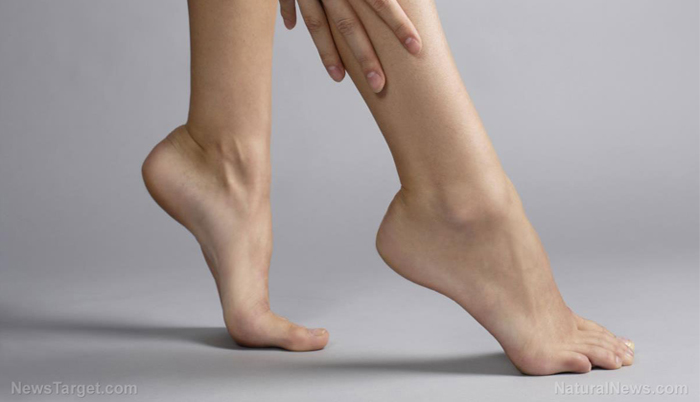![]() Home > Health
Home > Health
How Can Nutrients Help With Dermatitis?

News Target | Natural News
![]() April 2nd, 2022 | 16:53 PM |
April 2nd, 2022 | 16:53 PM | ![]() 309 views
309 views
NATURALNEWS
A person’s nutritional status affects his body’s immune function. Scientific evidence of this has sparked interest in the possible role dietary factors play in the pathogenesis of skin conditions like atopic dermatitis (AD). While food allergies and elimination diets have been studied in relation to atopy — a genetic tendency to develop allergic diseases — the impact of vitamins, minerals and other micronutrients on the risk of AD and the severity of AD symptoms is yet to be explored.
In an article published in The Journal of Alternative and Complementary Medicine, researchers from the University of California, Davis and the University of Arizona conducted a systematic search to evaluate the role of oral micronutrients in the development of AD. They reviewed 49 different studies and discussed how various micronutrients, such as vitamins C, E and D and trace minerals like zinc, selenium, copper and strontium, are linked to AD. They also highlighted how supplementation affects the severity of AD.
What is atopic dermatitis?
Atopic dermatitis is a chronic inflammatory skin condition that affects more than 18 million adults in the U.S. It is the most common type of eczema and manifests as a red, itchy rash on the arms, cheeks and/or legs. While the exact cause of AD is still unknown, scientists have found that a complex interplay between immune system dysfunction, genetics and environmental factors contribute to its development.
Inflammation, which causes the redness and itchiness typical of AD, can be triggered by internal or external elements, such as a bacterial infection. Studies also point to a mutation in the gene encoding for filaggrin as another contributor to AD. Filaggrin is a protein that helps maintain the skin’s protective barrier. Filaggrin not only helps seal in moisture, it also keeps microbes from entering the skin. People with AD often have dry and infection-prone skin due to mutations in the filaggrin gene.
Micronutrients and atopic dermatitis
The global prevalence of AD has risen over the last three decades. Statistics show that AD affects about 20 percent of children and three percent of adults worldwide. Due to the effect nutrition has on immune function, scientists believe that adequate intake of the following vitamins and minerals can help with the management of AD.
Vitamin C
Ascorbic acid is well-known for its antioxidant properties, which allow it to reduce oxidative damage to cells. Studies reveal that urine and serum markers of oxidative stress are higher in children with AD than in those without. Increasing plasma vitamin C levels can help with AD management as it improves ceramide production in the epidermis. Ceramides are the major building blocks of the skin’s lipid barrier, which is crucial for the organ’s barrier function.
Vitamin E
Tocopherol is a fat-soluble vitamin with antioxidant and anti-inflammatory properties. According to clinical trials, vitamin E supplementation improves skin itching and the healing of lesions. Although vitamin E deficiency does not contribute to the development of AD, comparisons between the vitamin E intake of people with and without AD suggest that it has a protective effect against AD.
Vitamin D
Another fat-soluble vitamin, vitamin D is needed for proper immune function, specifically immune reactivity and skin barrier integrity. According to several studies, vitamin D deficiency increases not just the risk of AD, but also the severity of AD symptoms. Vitamin D supplementation, on the other hand, reduces the severity of AD in both children and adults.
Zinc and copper
Zinc and copper are trace minerals involved in cell growth and function. Human studies show that while hair and serum copper levels are positively correlated with AD risk, zinc levels are the opposite. Zinc supplementation also only improves the severity of AD in adults. Because high doses of zinc may interfere with copper absorption in the intestine, researchers recommend supplementing with both copper and zinc.
Selenium and strontium
Skin cells require sufficient amounts of selenium to ensure that they can fight oxidative stress, a major cause of inflammation. Meanwhile, strontium is said to inhibit skin irritation when applied topically. According to a cohort study, selenium deficiency in infants and their mothers increases the former’s risk of AD. While strontium deficiency in infants also has a similar effect, maternal strontium deficiency decreases AD risk for infants.
The findings discussed in the review prove that certain micronutrients play a role in AD. If you suffer from AD, make sure you meet your daily nutritional requirements, especially for the nutrients listed above. Seek advice from a health care practitioner before taking any supplements to avoid unfavorable interactions with any medication you are currently taking.
Source:
courtesy of NATURALNEWS
by Evangelyn Rodriguez
If you have any stories or news that you would like to share with the global online community, please feel free to share it with us by contacting us directly at [email protected]